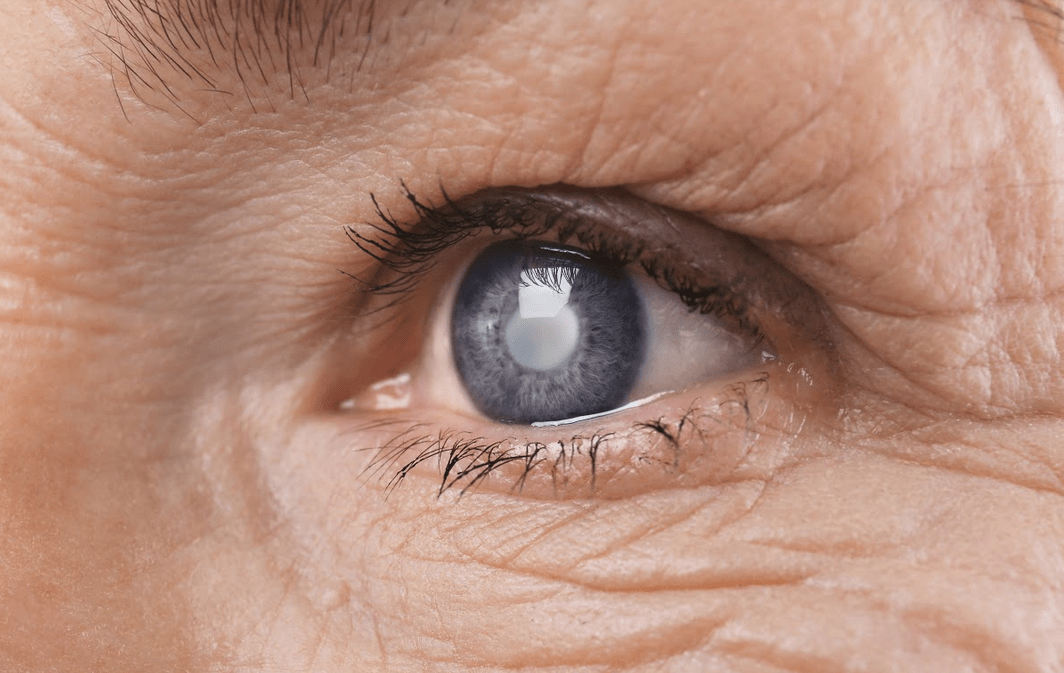An eye condition that can cause vision loss and blindness in people with diabetes, diabetic retinopathy affects blood vessels in the retina, the light-sensitive layer of tissue in the back of the eye.
It’s important for anyone diagnosed with diabetes to get a comprehensive dilated eye exam at least once a year. While diabetic retinopathy may not present any symptoms initially, in later stages of the disease blood vessels in the retina start to bleed into the vitreous (gel-like fluid in the centre of the eye).
If this happens, you may see dark, floating spots or streaks that look like cobwebs. Sometimes, the spots clear up on their own, but it’s important to get treatment immediately. Without treatment, the bleeding can recur, get worse, or cause scarring. Therefore, early detection is crucial in determining the steps you need to take to protect your vision.
Cause of Diabetic Retinopathy
 Diabetic retinopathy is caused by high blood sugar due to diabetes. Over time, having too much sugar in your blood can damage your retina, the part of the eye that detects light and sends signals to the brain through a nerve in the back of the eye (optic nerve).
Diabetic retinopathy is caused by high blood sugar due to diabetes. Over time, having too much sugar in your blood can damage your retina, the part of the eye that detects light and sends signals to the brain through a nerve in the back of the eye (optic nerve).
Diabetes damages blood vessels throughout the body. The damage to the eyes starts when sugar blocks the tiny blood vessels that go to the retina, causing them to leak fluid or bleed. To make up for these blocked blood vessels, your eyes then grow new blood vessels that do not work well. These new blood vessels can leak or bleed easily.
Complications
Diabetic retinopathy involves the abnormal growth of blood vessels in the retina. Complications can lead to serious vision problems, including:
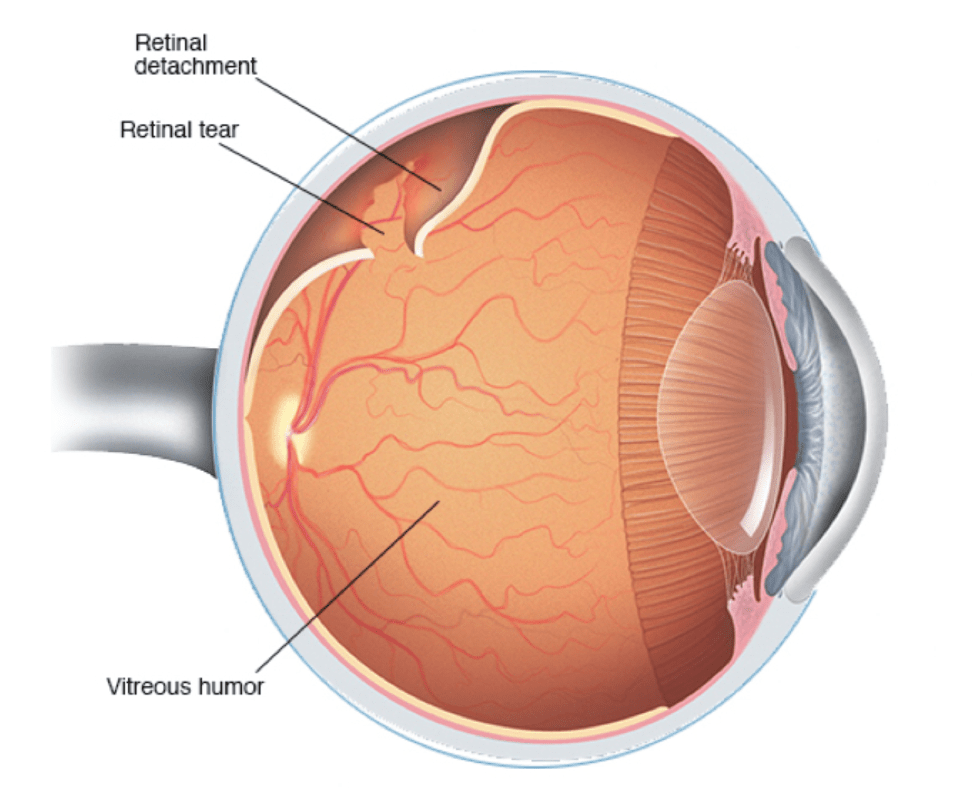
- Vitreous hemorrhage: The new blood vessels may bleed into the clear, jelly-like substance that fills the centre of your eye. If the amount of bleeding is small, you might see only a few dark spots (floaters). In more severe cases, blood can fill the vitreous cavity and completely block your vision. Vitreous hemorrhage by itself usually doesn’t cause permanent vision loss. The blood often clears from the eye within a few weeks or months. Unless your retina is damaged, your vision may return to its previous clarity.
- Retinal detachment: The abnormal blood vessels associated with diabetic retinopathy stimulate the growth of scar tissue, which can pull the retina away from the back of the eye. This may cause spots floating in your vision, flashes of light or severe vision loss.
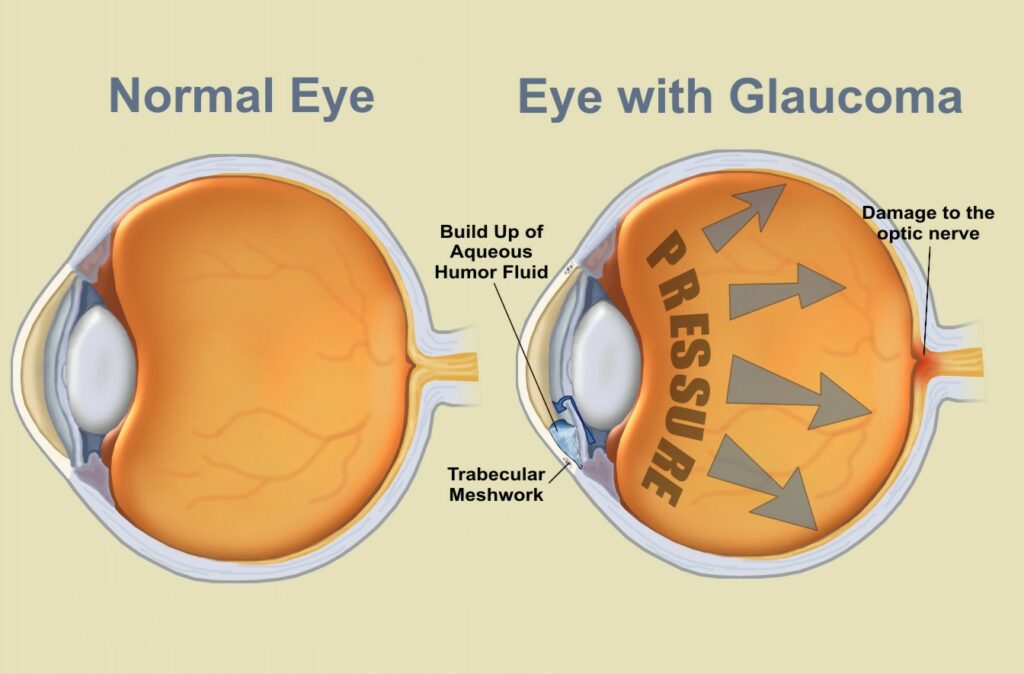
- Glaucoma: New blood vessels may grow in the front part of your eye and interfere with the normal flow of fluid out of the eye, causing pressure in the eye to build up (glaucoma). This pressure can damage the nerve that carries images from your eye to your brain (optic nerve).
- Blindness: Eventually, diabetic retinopathy, glaucoma or both can lead to complete vision loss.
It’s worth noting that while diabetic retinopathy is the most common cause of vision loss for people with diabetes, diabetics also run the risk of developing other eye conditions, including cataracts, open-angle glaucoma, diabetic macular edema, neovascular glaucoma, and retinal detachment.
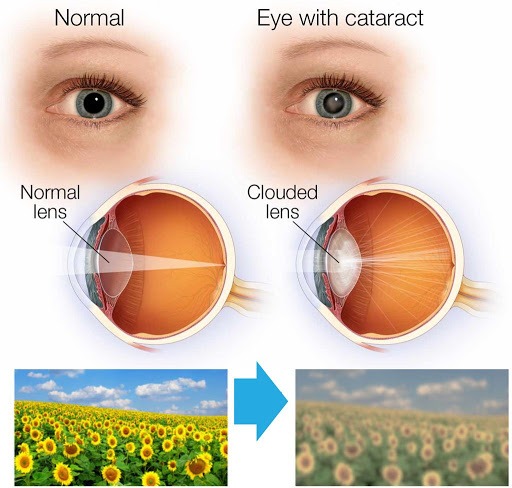
- A cataract is a clouding of the lens of the eye which leads to decreased vision. Cataracts often develop slowly and can affect one or both eyes. Symptoms may include faded colours, blurry or double vision, halos around light, trouble with bright lights, and trouble seeing at night. Having diabetes makes you 2 to 5 times more likely to develop cataracts. It also makes you more likely to get them at a younger age.
- In open–angle glaucoma, the angle in your eye where the iris meets the cornea is as wide and open as it should be. However, the eye’s drainage canals become clogged over time, causing an increased internal eye pressure and subsequent damage to the optic nerve. Having diabetes nearly doubles your risk of developing a type of glaucoma called open-angle glaucoma.
- Over time, nearly 50% of people with diabetic retinopathy will develop diabetic macular enema, or DME, which occurs when blood vessels in the retina leak fluid, causing swelling in the macula (a part of the retina). People with DME will experience blurry vision because of the extra fluid in their macula.
- Diabetic retinopathy can cause abnormal blood vessels to grow out of the retina and block fluid from draining out of the eye. This causes a type of glaucoma, neovascular glaucoma.
- Diabetic retinopathy can cause scars to form in the back of your eye. When the scars pull your retina away from the back of your eye, it’s called tractional retinal detachment.
Prevention
Managing diabetes is the best way to lower your risk of diabetic retinopathy. This means keeping your blood sugar levels as close to normal as possible. You can do this by getting regular physical activity, eating healthy and carefully following your doctor’s instructions for your insulin or other diabetes medication.
To help control your blood sugar, you’ll need a special test called an A1c test, which shows your average blood sugar level over a three-month period. Consult your doctor about lowering your A1c level to help prevent or manage diabetic retinopathy.
Having high blood pressure or high cholesterol along with diabetes increases your risk for diabetic retinopathy. By controlling your blood pressure and cholesterol, you’re also helping to lower your risk for vision loss.
Treatment
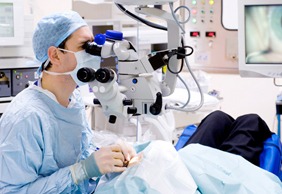
The diagnosis for diabetic retinopathy is having a dilated eye exam. Treatment include medication, laser treatment, and surgery. Staying physically active, eating healthy and taking your medication are key ways to manage your diabetes and help prevent or delay vision loss.
- Injections: Medicines called anti-VEGF drugs can slow down or reverse diabetic retinopathy. Other medicines, called corticosteroids, can also help.
- Laser treatment: To reduce swelling in your retina, eye doctors can use lasers to make the blood vessels shrink and stop leaking.
- Eye surgery: If your retina is bleeding a lot or you have a lot of scars in your eye, your eye doctor may recommend a type of surgery called a vitrectomy.
Patients with diabetes who successfully manage their blood sugar levels will help to prevent the onset of a severe form of diabetic retinopathy. They can achieve this by following these simple rules:
- Eating a healthy and balanced diet
- Exercising regularly
- Maintaining a healthy body weight
- Quitting smoking
- Strictly controlling alcohol intake
- Taking any anti-hypertensive measures according to their doctor’s instruction
- Having regular eye examinations to check and monitor any problems early
Who’s at risk of developing diabetic retinopathy?
Anyone with any kind of diabetes can get diabetic retinopathy, including Type I, Type II and gestational diabetes (diabetes that can develop during pregnancy). Your risk increases the longer you have diabetes.
More than 2 in every 5 Americans with diabetes have some stage of diabetic retinopathy. Fortunately, you can lower your risk of developing diabetic retinopathy by controlling your diabetes.
Women with diabetes who become pregnant — or women who develop gestational diabetes — are at high risk for getting diabetic retinopathy. Therefore, women with diabetes and are pregnant should have a comprehensive dilated eye exam as soon as possible. They should also ask their doctor as to whether they will need additional eye exams during their pregnancy.
How our eye doctor at Vision Express checks for diabetic retinopathy

At Vision Express, our Retinal Ophthalmologist, Dr. Alejandro Garcia, checks for diabetic retinopathy as part of a dilated eye exam. The exam is simple and painless. The doctor will give you some eye drops to dilate (or widen) your pupil and then check your eyes for diabetic retinopathy and other eye problems.
Vision Express has a regular diabetic clinic at the Rodney Branch to help with checking your blood sugar and advice on your diet. If you are diagnosed with diabetes, an annual eye examination is very important. With diabetic retinopathy, vision once lost cannot be restored, but further vision loss can normally be prevented.
The retina in your eye has tiny blood vessels that are easy to damage. Having high blood glucose and high blood pressure for a long time can damage these tiny blood vessels. Diabetic retinopathy affects up to 80% of those who have had diabetes for 20 years or more. At least 90% of new cases can be reduced with proper treatment and monitoring of the eyes. The longer a person has diabetes, the higher his or her chances of developing diabetic retinopathy.
Any signs of diabetic retinopathy, at a routine eye examination, will be referred to the Vision Express Retinal Ophthalmologist, Dr. Alejandro Garcia. A careful check of the retina with a fundus camera will then be undertaken, plus a full monitoring of the condition with the very latest Zeiss Cirrus 5000 OCT. An OCT is similar to ultrasound testing but uses light rather than sound to produce images. The scan can also detect diseases of the optic nerve.
Diabetic retinopathy usually affects both eyes. Over time, too much sugar in your blood can lead to the blockage of the tiny blood vessels that nourish the retina, cutting off its blood supply. As a result, the eye attempts to grow new blood vessels. But these new blood vessels don’t develop properly and can leak easily.
Advanced Treatment
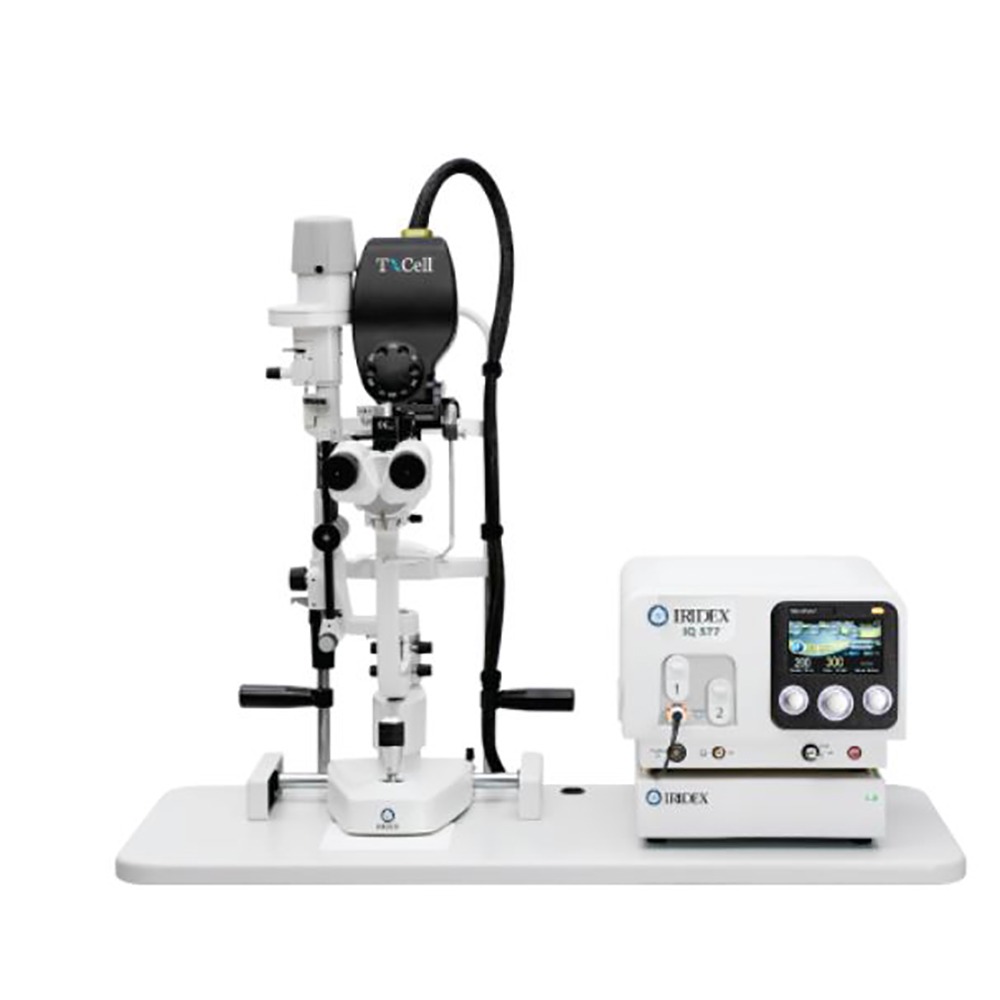
Vision Express, under the very experienced use by Dr. Garcia, the Retinal Surgeon on the Vision Express team, can treat advanced diabetic retinopathy with the Iridex IQ 577. This is the top of the line latest laser equipment for treatment of diabetic retinopathy. The Iridex IQ577 is a yellow light laser.
This new laser option requires less power and shorter pulse durations to treat the retinal bleeding. This not only improves the comfort level but also can be used more frequently to repair damage, than the older laser equipment.
The state-of-the-art Iridex IQ577 is only used at Vision Express Surgery Centre at Karlione Court, Rodney Bay, and this advanced yellow laser is not available anywhere else in Saint Lucia.
“Vision Express is very oriented to eye care, especially to patients with diabetes,” says Dr. Garcia. “It’s very important because we have many people in Saint Lucia with diabetes. When a person is diabetic for more than five years, they start to experience problems with their retinas. It’s a very silent situation because until their central vision is not affected, they do not realize that. That’s why it’s very important for these patients to get routine eye checks.”
Vision Express also has a very high-tech laser which can be used repeatedly. Previously, the machine ophthalmologists used for treatment of diabetic retinopathy left scars on the back of the eye. So once used, it could not be used again. This is not the case with our new laser because we can use it anytime.
Another unique treatment offered at Vision Express is the eye injection. Some patients are unable to improve their condition through laser treatment, so they need another method of treatment. As such, the eye injection now available in Saint Lucia for the first time – only at Vision Express.
“In the near future, we’ll be able to do retinal surgery for patients with diabetic retinopathy. It will be a huge plus for us and patients,” Dr. Garcia noted.
Dr. Garcia says the most common form of diabetic retinopathy in Saint Lucia is Type II Diabetes for which patients only need tablets most of the time. However, if treated at a late stage, they will also need insulin. Most of the time, our patients at Vision Express are middle-aged with a history of not following proper dieting methods. Which is why he offers the following advice.
“My advice to anyone who has been diagnosed with diagnosed with diabetes is to get an eye examination,” Dr. Garcia said. “Quite often, they’ve been diabetic for a long time and didn’t realize it. Get tested early – the earlier the better. But at least once a year.”
At Vision Express, we offer patients information about diabetes so that they are better informed. This means they get a better picture of their condition. They also get the chance to get treatment that was not available before in Saint Lucia.


